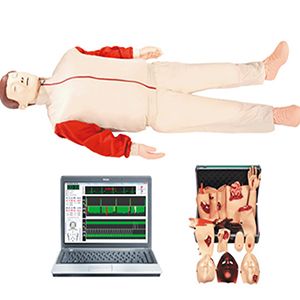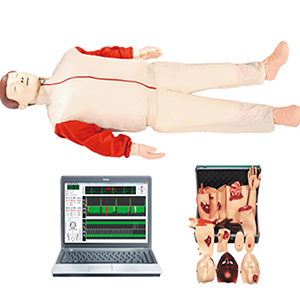
Can advanced cardiopulmonary resuscitation trauma simulators reduce errors in real first aid?
Article tag: Advanced CPR trauma simulator CPR model BIX/ACLS900

Advanced Cardiopulmonary resuscitation Trauma simulators enable medical students and first responders to practice first aid skills and gain clinical experience in a risk-free environment through realistic, detailed simulation of physiological responses and trauma scenarios. The data supported research results show that simulation training can effectively reduce operational errors in real first aid, improve the success rate of first aid, and enhance the emergency response ability of medical staff. With the continuous development of simulation technology, such simulators will increasingly become an indispensable tool in medical education, providing strong support for improving the quality of emergency medical care and patient survival.
...
In emergency medicine, cardiopulmonary resuscitation (CPR) and trauma aid are often critical steps in saving lives. However, in the real first aid process, due to the complex environment, operating pressure, lack of experience and other factors, medical staff may make operational errors, which directly affect the survival rate and treatment effect of patients. Advanced cardiopulmonary resuscitation trauma simulator, as a highly simulated clinical training tool, can provide a risk-free training platform for medical personnel to improve their first-aid skills and reduce operational errors in real first aid.
Clinical significance

Cardiopulmonary resuscitation and trauma first aid are critical skills in the medical field, especially in clinical Settings such as emergency, ICU, and surgery, where any error can lead to a patient's condition worsening or death. For medical students, how to quickly and accurately complete first aid operations in a tense environment is a basic skill that must be mastered before entering clinical posts. However, traditional classroom explanation and observation teaching often cannot provide enough practical experience, which makes simulation training an effective means to solve this problem.
The Advanced cardiopulmonary resuscitation trauma simulator simulates real anatomical structure and physiological characteristics, and can accurately restore emergency situations such as cardiac arrest, traumatic bleeding, and airway blockage. Through simulation, students are able to perform repeated training without risk to patients. Especially in trauma first aid, simulators can demonstrate physiological responses such as blood flow, breathing, and heartbeat, giving students immediate feedback and helping them quickly master key technologies such as airway management, external chest cardiac compression, and drug administration. In addition, simulation training can also enhance students' ability to cope with sudden and complex situations, improve their emergency response speed and decision-making ability.
Data support
A number of studies have shown that advanced cardiopulmonary resuscitation trauma simulators can significantly improve the accuracy and success rate of first aid operations. A study of emergency medicine training showed that medical students and health care workers who underwent simulated training improved their CPR success rate by about 30 percent. These students were able to more accurately master the depth, frequency, and airway management skills during simulated first aid, thus increasing the likelihood of successful first aid.
Another study focused on the training of trauma first aid skills, and showed that emergency teams trained with trauma simulators had a 20% lower rate of operational errors in actual first aid than traditional training groups. The simulation training also effectively improved the students' comprehensive response ability in the trauma scene, especially in dealing with complex situations such as multiple injuries and respiratory distress, so that they could make judgments more quickly and take appropriate measures. In addition, after the simulation training, the trainees' confidence in the operation was significantly enhanced, thus reducing the mistakes caused by tension and uncertainty.
Clinical feedback and application
According to clinical feedback, simulation training can not only help medical staff improve their skills, but also relieve psychological pressure in actual work to a certain extent. Emergency personnel are often affected by tension and stress when dealing with real patients, especially in complex situations such as trauma or cardiac arrest, where the slightest mistake can lead to operational error. Through simulation training, students can practice repeatedly, get familiar with the operation process and steps, enhance the familiarity and self-confidence of the first aid process, and thus reduce the mistakes caused by panic or tension.
Training with advanced cardiopulmonary resuscitation trauma simulators has become standard practice in several hospitals and emergency training centers to improve the quality of emergency care. These models not only play a fundamental role in the training of first aid skills, but also provide a solid guarantee for improving medical quality and patient safety.
Sum up
Advanced Cardiopulmonary resuscitation Trauma simulators enable medical students and first responders to practice first aid skills and gain clinical experience in a risk-free environment through realistic, detailed simulation of physiological responses and trauma scenarios. The data supported research results show that simulation training can effectively reduce operational errors in real first aid, improve the success rate of first aid, and enhance the emergency response ability of medical staff. With the continuous development of simulation technology, such simulators will increasingly become an indispensable tool in medical education, providing strong support for improving the quality of emergency medical care and patient survival.

Marketing Center
Hong Kong, ChinaProduction Base
Shanghai, ChinaProducts
Contact Us
 Address: Hong Kong, China
Address: Hong Kong, China
 Phone:+86 19937901373
Phone:+86 19937901373
 Email:sophia@adahealthy.com
Email:sophia@adahealthy.com
 Mobile:+86-0379-65160607
Mobile:+86-0379-65160607








